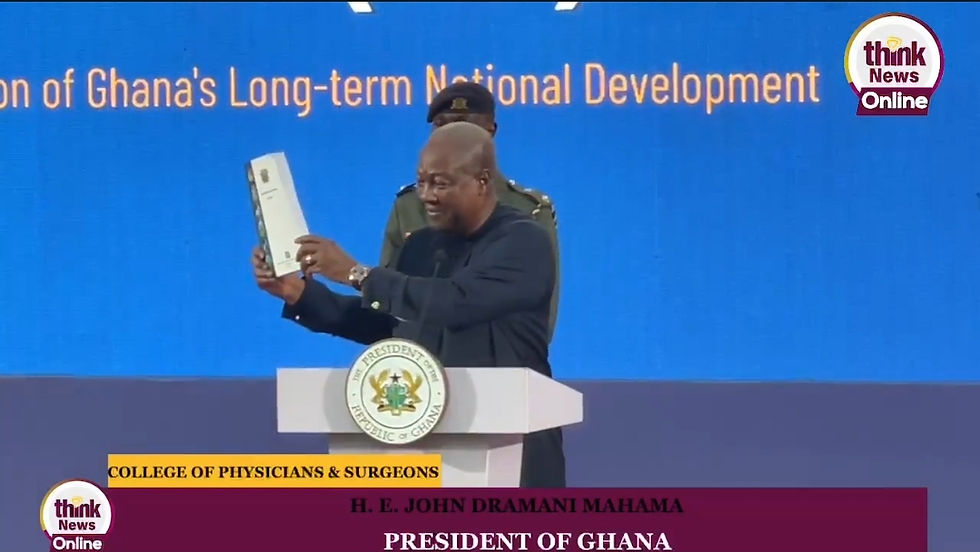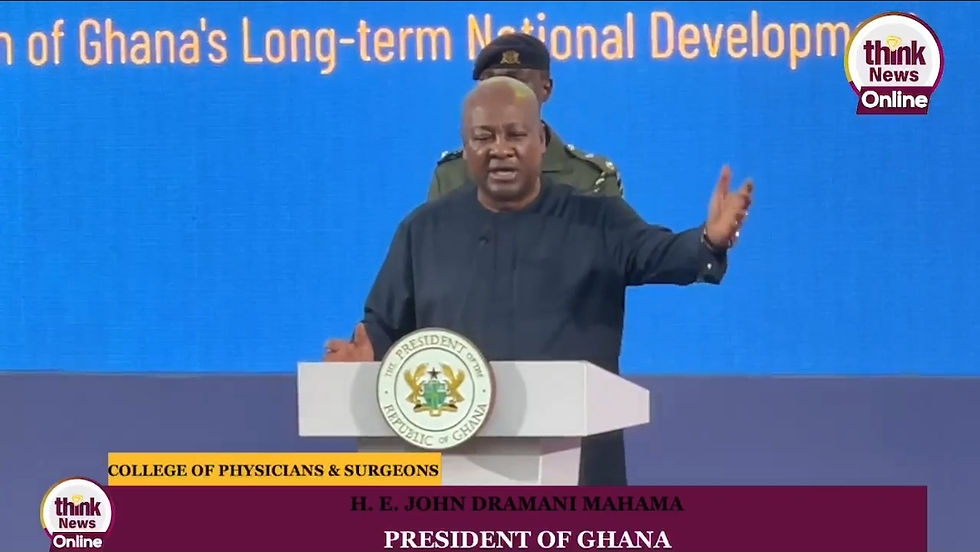“We inherited Nkrumah’s dream, but are yet to fulfil its promise” — Prez. Mahama
- Think News Online

- Oct 22
- 3 min read

President John Dramani Mahama has launched the Ghana Infrastructure Plan (GIP) — a 30-year strategic framework aimed at transforming Ghana’s infrastructure landscape and breaking the cycle of abandoned and politicised projects.
Speaking at the launch event in Accra on Wednesday, President Mahama described the GIP as a “strategic reset” for national development, declaring that “we inherited Nkrumah’s dream, but we have yet to fulfil its promise.”
The plan, developed by the National Development Planning Commission (NDPC), provides a long-term roadmap for coordinated investments across key sectors such as transport, energy, water, housing, and ICT.
Initially prepared in 2016 and revised in 2019, the GIP has now been revived as the anchor for government’s “Big Push” infrastructure initiative.
President Mahama drew inspiration from Ghana’s first post-independence leader, Dr. Kwame Nkrumah, who launched the country’s seven-year development plan in 1963.
"He built roads, railways, schools, and energy systems to connect our people and unlock Ghana’s productive potential. That vision was bold, patriotic, and transformative — and it remains timeless even today,” he said.
Highlighting recent inefficiencies in public investment, the President cited findings from the 2024 National Annual Progress Report by the NDPC, which revealed over GH¢70 billion in cost overruns across 18,000 capital projects, many of which suffered delays or were abandoned.

To ensure fiscal discipline, President Mahama announced a legal cap on the national debt ceiling at 45 per cent of GDP by 2034 and the creation of a Fiscal Responsibility Council to enforce compliance under the Public Financial Management Act (PFMA) 921.
He also revealed that the acting Chief Justice had agreed to establish specialised courts to fast-track the prosecution of individuals implicated in financial mismanagement.
He recounted one example from the Auditor-General’s reports, where “the staff of a hospital attended a person’s funeral and after that continued paying him for 26 months,” underscoring the need for stronger accountability systems.

Under the revived GIP, the government’s “Big Push” initiative will prioritise the completion of abandoned and delayed projects, in keeping with Article 35(7) of the 1992 Constitution, which obliges successive governments to continue projects initiated by their predecessors.
“The ‘Big Push’ is not about spending more; it’s about spending wisely,” President Mahama stressed.
“Every cedi must be guided by the GIP’s priorities to ensure value for money and lasting national impact.”

Among the major projects to be rolled out are the Green Digital City transformation hub, expansion of urban water systems in Kumasi, Tamale, Sogakope, and Ho, and the development of strategic road and transport corridors across the country.
He also announced plans to establish an agro-industrial park in northern Ghana, offering incentives to attract foreign investors away from the capital to create jobs and promote balanced regional growth.
President Mahama lamented the geographical imbalance in national development and criticised the replacement of the Savannah Accelerated Development Authority (SADA) with development authorities that, in his words, had made “no impact, absolutely.”
Delivering the welcome address, Dr. Audrey Smock Amoah, Director-General of the NDPC, described the GIP as a “living framework for inclusive and sustainable growth,”

NDPC Chairman, Dr. Nii Moi Thompson traced the plan’s roots to Dr. Nkrumah’s 1965 infrastructure agenda and called for continuity through a forthcoming long-term framework — Ghana Vision 2057: A Roadmap to Economic Transformation and Shared Prosperity.

As President Mahama concluded, he reminded Ghanaians that infrastructure development was not merely a technical exercise but a moral and generational duty:
“We owe it to ourselves — and to the visionaries before us — to build a Ghana whose progress endures beyond political cycles and stands the test of time.”
Story by: Joshua Kwabena Smith








Comments